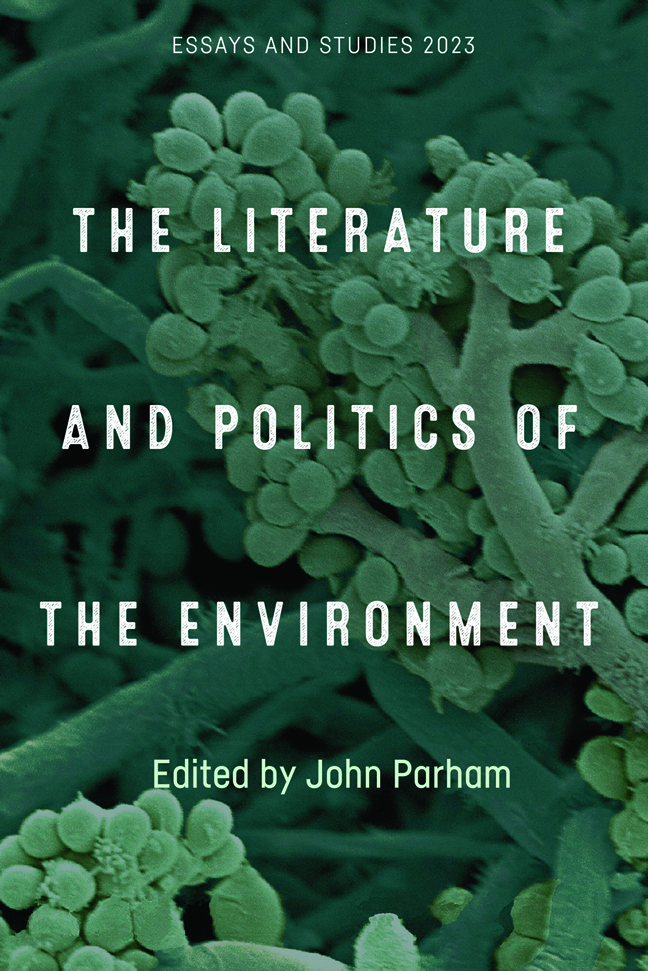Book contents
- Frontmatter
- Contents
- Notes on Contributors
- Acknowledgements
- Introduction
- 1 Industry and Environmental Violence in the Early Victorian Novel: Pastoral Re-visions
- 2 Floating Cities, Imperial Bodies: Reading Water in Timothy Mo’s An Insular Possession (1986) and Xi Xi’s ‘Strange Tales from a Floating City’ (1986)
- 3 Sweet Food to Sweet Crude: Haunting Place through Planet
- 4 Nonhuman Entanglements in Adam Roberts’s Science Fiction: Bête (2014) and By Light Alone (2012)
- 5 Sum deorc wyrd gathers: Dark Ecology, Brexit Ecocriticism, and the Far Right
- 6 Literature, Literary Pedagogy, and Extinction Rebellion (XR): The Case of Tarka the Otter
- 7 The View from the Field: Activist Ecocriticism and Land Workers’ Voices
- 8 Nature Walking: Marching Against Privilege
- 9 To Be a Witness in the World
- Index
2 - Floating Cities, Imperial Bodies: Reading Water in Timothy Mo’s An Insular Possession (1986) and Xi Xi’s ‘Strange Tales from a Floating City’ (1986)
Published online by Cambridge University Press: 02 March 2024
- Frontmatter
- Contents
- Notes on Contributors
- Acknowledgements
- Introduction
- 1 Industry and Environmental Violence in the Early Victorian Novel: Pastoral Re-visions
- 2 Floating Cities, Imperial Bodies: Reading Water in Timothy Mo’s An Insular Possession (1986) and Xi Xi’s ‘Strange Tales from a Floating City’ (1986)
- 3 Sweet Food to Sweet Crude: Haunting Place through Planet
- 4 Nonhuman Entanglements in Adam Roberts’s Science Fiction: Bête (2014) and By Light Alone (2012)
- 5 Sum deorc wyrd gathers: Dark Ecology, Brexit Ecocriticism, and the Far Right
- 6 Literature, Literary Pedagogy, and Extinction Rebellion (XR): The Case of Tarka the Otter
- 7 The View from the Field: Activist Ecocriticism and Land Workers’ Voices
- 8 Nature Walking: Marching Against Privilege
- 9 To Be a Witness in the World
- Index
Summary
In reflecting on the fragile material ecologies of the former British Empire, postcolonial writers have shown how the transformations of the colonial era continue to shape the environmental vulnerabilities of the present. This overlap between colonial pasts and ecological futures is especially visible, as this essay will suggest, in literary imaginaries of the ‘floating city’. While floating cities and islands have featured in imaginative literature from Homer to Verne, they also surface at different moments in the specific history of Hong Kong. Dung Kai-cheung, in his ‘fictional archaeology’ published in the year of the handover from Britain, describes Hong Kong as a ‘marvellous invention’ and as a ‘mirage’ – an island ‘born from the waves of the sea’ whose towers extend into the air. Writing in the same year, Ackbar Abbas remarks on the city’s ‘“floating” identity’ as a space of flows in which ‘everything floats – currencies, values, human relations’. More recently, Leonard Kwok-kou Chan has emphasised Hong Kong’s status as ‘a floating city’ due to the uniqueness of its literary culture. Across these accounts, metaphors of floating capture the distinctiveness of Hong Kong’s identity, whether as a colonial entrepôt turned ‘cosmopolitan’ financial centre, or as an archipelago comprising over 250 islands and one of the most vertical cities in the world.
These floating metaphors also appear in an earlier wave of texts, written towards the end of British rule, where they serve to visualise Hong Kong’s colonial transformation in the nineteenth century. A noteworthy example is Timothy Mo’s historical novel An Insular Possession (1986), which draws on the image of the floating island to reconstruct Hong Kong’s inception during the First Opium War. Although the novel imagines the region in the pre-colonial period as an archipelago (its ‘[i]slands spread over the waters on both sides’, enveloped in ethereal cloud and ambiguously ‘locked by islands or continent’), it focuses on the region’s rapid transformation in the 1840s. Amid the new watery world of the opium trade, the novel conjures a terraqueous landscape of floating warehouses, floating barges, floating batteries, floating hotels, floating brothels, and floating opium hulks serviced by the smaller vessels of ‘fast crabs’ and ‘scrambling dragons’, whose ability to float secures the regime’s extra-territorial legality.
- Type
- Chapter
- Information
- The Literature and Politics of the Environment , pp. 29 - 48Publisher: Boydell & BrewerPrint publication year: 2023

